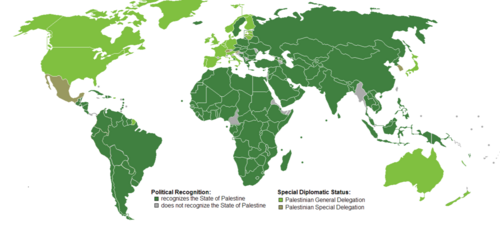User:Lihaas/International recognition of Palestine
| This is not a Wikipedia article: It is an individual user's work-in-progress page, and may be incomplete and/or unreliable. For guidance on developing this draft, see Wikipedia:So you made a userspace draft. Find sources: Google (books · news · scholar · free images · WP refs) · FENS · JSTOR · TWL |
 |
|---|
|
Officeholders whose status is disputed are shown in italics |
|
|
|
|
Palestine's status is under dispute, though it declared independence November 15, 1988. 106 countries of the world recognise Palestinian sovereingty under the pre-1867 borders.
Background
[edit]This section needs expansion. You can help by adding to it. |
The Palestinians have been working to persuade other countries to acknowledge their right to establish an independent state. Their target date is August 2011 - two years after the plan to establish a Palestinian state was first introduced by prime minister Salam Fayyad.
israel's reaction
[edit]State officials in Jerusalem expressed concern that other countries in Latin America and the world will follow in Brazil and Argentina's footsteps. Foreign Ministry spokesman Yigal Palmor said: "This is a very disappointing step which contributes nothing to furthering the peace process." / He described the announcement as "a verbal gesture which goes against the Oslo Accords whereby a permanent solution can only be the result of negotiations." Palmor stressed that the gesture "encourages the Palestinians at the very time when they insist on avoiding negotiations." / Foreign Ministry officials have therefore started holding low-profiles talks with Latin American leaders, Ynet learned. "This is a meaningless paper, a virtual declaration. These declarations may look good in print but lack any understanding of the Middle Eastern reality," a ministry source said.
Positions taken by states
[edit]
States which formally recognise Kosovo as independent
[edit]UN member states
[edit]| Country | Date of recognition | Status of reciprocal diplomatic relations | Notes | |
|---|---|---|---|---|
| 1 | ||||
| 2 | ||||
| 3 | ||||
| 4 | ||||
| 4 | ||||
| 1 | 1 December 2010 |
US lawmakers have called Brazil's decision "severely misguided" and "regrettable." | ||
| 2 | 6 December 2010 | Argentine President Cristina Kirchner wrote to her Palestinian counterpart Mahmoud Abbas saying her country recognizes a Palestine defined by 1967 borders, officials said. / "The Argentine government recognizes Palestine as a free and independent state within the borders defined in 1967," Argentine Foreign Minister Hector Timerman said, reading from the letter. | ||
| 3 | 6 December 2010 |
|||
| 3 | 6 December 2010 |
|||
| 4 | 18 December 2010 | |||
| 5 | 17 December 2010 | |||
| 6 | 7 January 2011 | |||
| 7 | 18 January 2011 | |||
| 7 | 28 January 2011 |
Of the world's nine most populous states, eight (all except the United States) recognise the State of Palestine. Of the world's 20 most populous states, 15 (all except the United States, Japan, Mexico, Germany and Thailand) recognise the State of Palestine.
By contrast, the 72 UN member states which currently recognize the Republic of Kosovo as an independent state include only one of the nine most populous states (the United States) and only four of the 20 most populous states (the United States, Japan, Germany and Turkey).
Non-UN member states
[edit]States which do not formally recognise Palestine as independent
[edit]UN member states
[edit]| Country | Position | Relevant international membership |
|---|---|---|
| Claims part of the territory | Israel has only asserted sovereignty over a small portion of its territory, expanded East Jerusalem, leaving sovereignty over the rest both literally and legally uncontested. |
Non-UN member states
[edit]| Country | Position | Relevant international membership |
|---|
Positions taken by intergovernmental organisations
[edit]Intergovernmental organisations do not themselves diplomatically recognise any state; their member states do so individually. However, depending on the intergovernmental organisation's rules of internal governance and the positions of their member states, they may express positive or negative opinions as to declarations of independence, or choose to offer or withhold membership to a newly-declared state.
| International organisation | Position |
|---|---|
Positions taken by non-state actors
[edit]International non-governmental organisations
[edit]| International organisation | Position |
|---|---|
| International Olympic Committee | |
| FIFA | |
| Asian Football Confederation |
Analysis
[edit]If the Arab League were now to call on the minority of UN member states which have not already recognised Palestine to do so promptly, it is certain that the response would be far superior (both in quantity and in quality) to the response to the recent American appeal on behalf of Kosovo.
See also
[edit]References
[edit]
Category:Independence of Kosovo Category:Politics of Palestine



